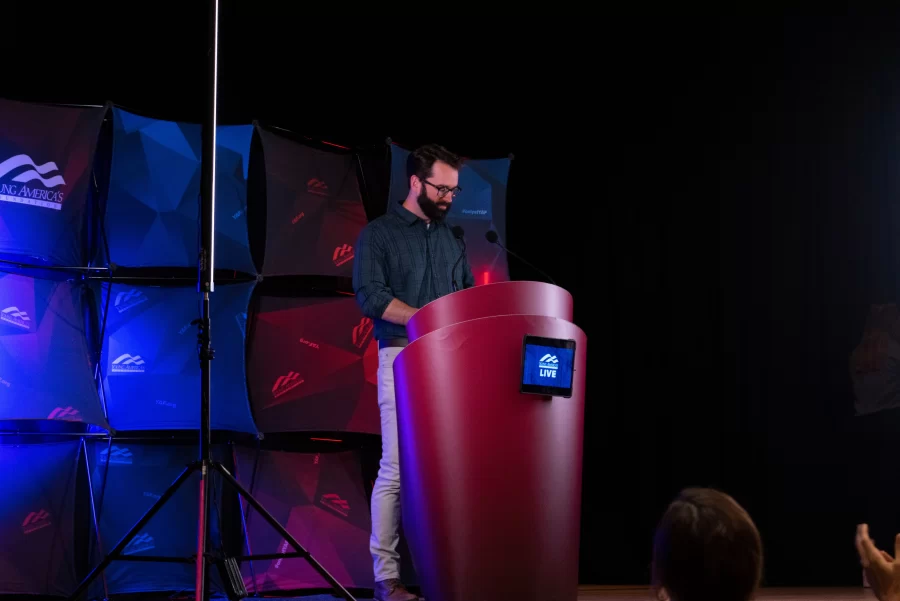Opinion | Political polarization is pointless
Writer and media personality Matt Walsh gives a speech at Gregory Hall on Oct. 6. Columnist
Nov 9, 2022
Most young people associate politics with polarization.
A product of the post-Cold War peace of the ’90s, the culture war has come to mean a conflict in which all parties involved believe they are fighting for the soul of America. Such a conflict has come to define politics, as both sides have polar opposite views on what it means to be “American.”
The culture war itself was recently brought to our campus, as controversial writer and media personality Matt Walsh gave a speech in Gregory Hall criticizing modern gender theory. This, naturally, heralded protests outside the event from those who saw Walsh’s views as transphobic.
Walsh’s speech defines the type of conflict caused by polarizing politics, as was the organized reaction from student activist groups.
Such events are commonplace as both sides try to one-up each other. Right-wingers protesting PTA meetings due to supposedly “immoral” content being taught in school classrooms has become a modern phenomenon just as common as what we saw recently on campus.
Get The Daily Illini in your inbox!
Truly, partisan outrage is alive and well in the United States during this cultural clash.
Of course, this is a college campus. The right to debate and protest is something that must be protected, as it is our constitutional right to do so.
However, sociologists have found a distinct value difference that makes such an argument perhaps not even worth having. When people disagree on the meaning of various fundamental arguments, one side usually has to give up their fundamental values in order for the other side to really “win.”
At this moment in American history, we have two clashing sets of values. Two very different ways of viewing the world have to share a country that was designed to run on compromise.
Therefore, this whole culture war is actually quite counterproductive, all things considered.
This is not to say that having strong opinions on cultural or social issues is unwarranted. Everybody, including myself, is biased toward one side or the other. But this shoving fight between the two sides doesn’t change anybody’s mind (sorry, Steven Crowder).
When you’re arguing from two completely different worldviews, even being able to understand where the other side is coming from is not easy. The two opposing parties may as well be speaking a foreign language to each other. That is why many arguments online about cultural and social issues tend to devolve into childish insults or go in circles. These types of arguments result in both sides becoming more and more rigid in their own views.
The sobering reality is that we may never agree with each other. The MAGA dads who share OANN articles and “Stop the Steal!” Facebook posts exist in a parallel universe to the trendy labor organizers who watch Hasan Piker.
Political values are usually shaped by things someone cannot change, like ethnicity and family, as well as personal values, which stem from things like religion, life experiences and overall upbringing.
Therefore, in this divided age, many of the differences in the ways we perceive reality simply come from the different values that we were raised with. Values and beliefs usually change with time, not with arguments.
Asking someone to give up their fundamental values is a tall order to fill. Therefore, there should be less time wasted arguing and more time trying to find common ground that everybody can at least partially agree on.
It should be humbling and awe-inspiring to both sides that we live in such a diverse world, where all of us have various pasts and histories. We should want to bridge these gaps and learn more about each other.
There is also the fact that we don’t live in the ’90s anymore. We may not have the free time to complain about petty stuff at each other like we used to.
Inflation, major conflicts across the world and climate change are all becoming very real political threats that will affect everyone significantly.
It’s time for Americans to grow up. Reality is disappointing; expecting everybody to agree on every issue probably isn’t going to happen. Real solutions require compromise, and if we do not meet the challenge to step up to this, reality will blindside and humble us quickly.
Dan is a junior in LAS.






